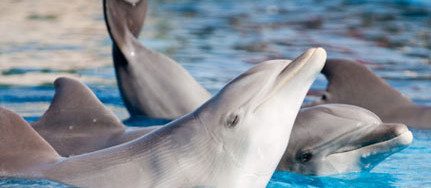- by Alicia Graef
- September 22, 2015
- 5:30 pm
Whale and dolphin advocates have been fighting against captivity for a long time. Since the documentary Blackfish started making waves, the plight of captive cetaceans has reached a much wider audience and has forced us to take a hard look at whether or not this is something we should be supporting.
In a series of new papers, Dr. Joan Gonzalvo, who has been studying dolphins in the wild for more than 15 years, examines some of the reasons why dolphin captivity needs to end and dispels some of the myths the industry uses to keep people coming back.
Gonzalvo’s most recent paper, which was just released by the Born Free Foundation and the Italian animal protection organization, Lega Anti Vivisezione, challenges the captivity industry and highlights five of of the main reasons we shouldn’t be keeping dolphins in tanks:
- They Are Intelligent
- They Are Social Beings
- They Are Far-Ranging Predators
- They Are Psychologically and Emotionally Sensitive
- Captivity Does Not Support Education or Conservation
Their intelligence, which Dr. Gonzalvo calls on par with great apes and human toddlers, might be what draws us to them, but it also means the barren conditions we keep them in can cause them tremendous suffering.
In the wild they live in complex cultures where they can explore, hunt, communicate, grieve losses and make choices. In captivity, they are denied the opportunity to do any of those things and are left without the ability to choose or stay with their friends, or escape bullying, while left in artificial pools that can never come close to simulating their natural environment.
Possibly one of the most important points made is that captivity does not support education or conservation, which is one of the main arguments the industry uses to keep us coming back. Supporters say we need to keep cetaceans in captivity because it makes them accessible to the public and offers opportunities to educate us about them and the environment, but critics continue to argue there’s nothing educational about dolphin shows and keeping them captive isn’t doing anything for conservation.
In a review of dolphin shows, Dr. Gonzalvo found only 10 percent of the ones he examined included anything educational about dolphin behavior, biology or their natural environment. He writes, “The main purpose of these performances is to display dolphins for human entertainment and amusement, rather than to convey any information on the real nature of these fascinating sea creatures, while obscuring the cruelty of the obvious fact that the “performers” are captive animals exhibited for the ultimate purpose of making money.”
Worse, he added that the way we use them as performers for entertainment creates the perception that dolphins are friendly, causing people to unwittingly harass them in the wild.
Then there’s the captivity industry’s link to violent and heartbreaking captures still taking place today also certainly does nothing for the plight of wild dolphins, or the health of the oceans.
“I invite those considering visiting a dolphinarium with their children to think twice about the message we want to give to future generations. Do we have any right to hold a highly evolved, intelligent, and sensitive animal captive, to force it to conduct a rather clownish behavior by performing tricks and stunts for our entertainment? If that is the case, we should seriously review our concept of what is entertaining and the kind of relationship that we want to have with nature. Let’s make people conscious about what is hidden behind the frozen smile of a captive dolphin,” Dr. Gonzalvo said in a statement.
While many areas are moving to end the exploitation of these species, there are still some who are willing to put profits over the well-being of dolphins and are trying to expand dolphin parks.
For more info on how to help captive and wild dolphins, check out organizations including Dolphinaria Free Europe, the Dolphin Project and Whale and Dolphin Conservation.




